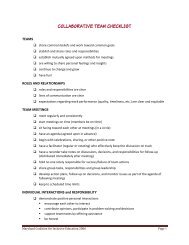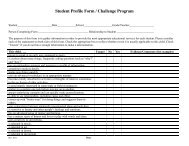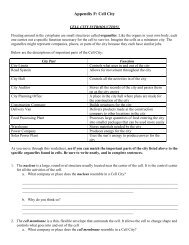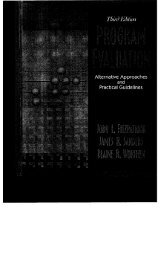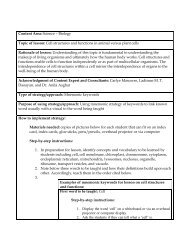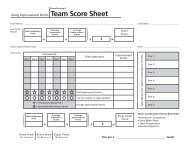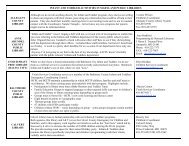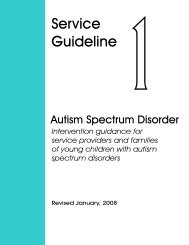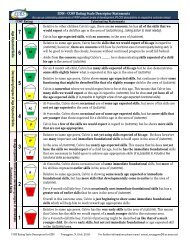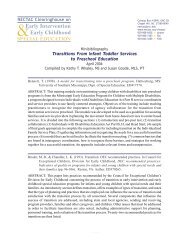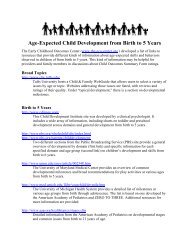written in a foreign language. I lackedthe confidence to read statistical textand research methodology at the beginningof my doctoral program, and thatlack of confidence threatened both mymotivation and my reading comprehension.Over time, I developed competencein reading these kinds of textsandconfidence in my ability to do so.Explicit instruction in reading comprehensionstrategies is essential tobringing struggling readers along. Butwithout a sense of competence,students will have a hard time digginginto enough positive reading experiencesto get the practice <strong>they</strong>'ll need tointernalize those strategies.Self-Efficacy andText ComprehensionUncertainty, coupled with lack ofstrategy, subverts too many strugglingreaders' ability to comprehend text.When middle or high school studentsapproach content-area reading assignments,some feel confident in theirability to pull off the task, but manyothers feel clueless about how tosuccessfully comprehend the text.Self-efficacy and text comprehensionare not only situational but also interrelated,and motivation is related to bothelements. If students believe, forexample, that <strong>they</strong> have a good chanceof succeeding at understanding what<strong>they</strong> are reading, then <strong>they</strong> are likely tobe more motivated to engage in readingand to persevere. Guthrie and Wigfield(2000) call for "a reading engagementmodel" that underscores the importanceof both increasing students' motivationto read and providing instructionin comprehension strategies andsocial interaction in the classroom.Without the spur of motivation, strugglingstudents stand less chance ofbecoming engaged readers.Strategies to IncreaseEngagementOne of the realities facing teachersacross all content areas today is thatmany students either read at a superficiallevel to answer homework questionsor find ways to circumventreading altogether. When I wastempted to take the avoidance path as agraduate student, I was fortunate tohave the family support and personalmotivation to keep me going and helpme develop workable strategies. Educatorsneed to give struggling readers thesame kind of boost by increasing theirmotivation to comprehend texts andintroducing students to a variety ofcomprehension strategies. Effectiveresearch-based comprehension strategiesinclude question generation, questionansweringroutines, comprehensionmonitoring, cooperative learning,summarization, graphic organizers, andfamiliarity with different text structures.To use any comprehension strategyeffectively, students need to focus theirattention on the reading task at hand.Simply assigning them a text for homeworkor in-class discussion won'tnecessarily guarantee that <strong>they</strong> willattend to the reading task with thefocus needed for effective comprehension.In fact, the opposite may be thecase. Students with low self-efficacy <strong>can</strong>easily become discouraged with thetask before <strong>they</strong> even start if their onlymotivation is to fulfill an assignment.Once into reading, these students'minds will quickly wander from thereading task if the text holds noinherent interest for them, if <strong>they</strong> readwithout purpose, or if <strong>they</strong> fail to makepersonal connections with the materialas <strong>they</strong> are reading. If students lackengagement with texts, <strong>they</strong> areunlikely to tap into whatever readingstrengths and strategies <strong>they</strong> possess.ASSOCIATION FOR SUPERVISION AND CURRICULUM DEVELOPMENT 57
What teachers do before assigningstudents a text is an integral part ofinstruction in content-centered literacylessons. Teachers are in a better positionto increase students' motivation if<strong>they</strong> activate learners' backgroundknowledge and get students <strong>think</strong>ingabout the topic before <strong>they</strong> begin toread. Prereading instructional strategiesoften involve arousing curiosity aboutthe topic, evoking predictions andcreating anticipation for reading,presenting problems to be solvedthrough reading, or eliciting studentgeneratedquestions about the materialbefore assigning a particular text (Vacca& Vacca, 2005).Using Real-Life MotivatorsName That SnakeA personal anecdote <strong>can</strong> be a powerfulinstructional tool that establishes apersonal context in which readers <strong>can</strong>interact with new information. Forexample, a middle school scienceteacher I taught in one of my graduateleveleducation courses used a real-lifesituation that he had encountered topique his students' interest beforeassigning research about snakes as partof a unit on reptiles. While looking fora parking spot, the teacher had noticeda flyer posted on a telephone pole,readingSNAKE FOUNDSUNDAY, OCTOBER 24ON INDIANA AVENUEPLEASE CALL 262-9415DESCRIBE TO CLAIMThe science teacher retrieved theflyer to use as a motivational tool in hisstudents' study of snakes. Before heeven assigned reading materials, theteacher recounted to students how hehad come across the flyer en route to acollege football game. He arousedstudents' curiosity with this simpleanecdote. Next, he elicited studentquestions by establishing a hypotheticalproblem to be solved. He asked theConnecting readingmaterial to students'lives activatesstudent motivation.students, "If you were to make a telephonecall in response to the flyer, whatwould you need to know about the lostsnake in order to describe it and claimit?" This led to discussion in whichstudents raised such questions as, "Is ita pet snake or a wild snake?" and"What does the snake look like?" Theclass decided that the snake had to besomeones pet, especially if it had beenfound near a college campus in anurban area.To tap students' background knowledge,the teacher then started a discussionabout what kinds of snakes makegood pets. Once students were curiousand motivated to solve the problem,<strong>they</strong> formed collaborative groups, eachconducting a purposeful search forinformation about various kinds of pet@snakes. The teacher, working with theschool librarian, had gathered togethervarious resource books about snakesfor the student teams to use in theirresearch. In addition to books, studentteams were encouraged to use theInternet to find information about petsnakes. After researching the topic,each team had to choose one kind ofsnake to describe in detail. The teacherthen had students role-play the telephoneconversation that might occur if<strong>they</strong> called to claim the snake.This science teacher followed areading engagement model to involvestudents in an active, purposeful, andthoughtful search for text informationabout snakes. From a strategy perspective,students were engaged in <strong>think</strong>ingabout texts before, during, and afterreading.Creating Hooks to Students' LivesUsing an analogy that connects readingmaterial to students' lives is anotherway to activate student motivation.Mathiason (1989) suggested that analogiesprovide "cognitive hooks" onwhich to hang new ideas. These hookshelp students look at their past experiencesand existing knowledge in newways.For example, consider a high schoolEnglish teacher who is beginning a uniton Shakespeare by introducing studentsto the importance of theater in the livesof people during Shakespeare's time.The teacher might make an analogybetween modern moviegoers andtheatergoers in the Elizabethan era.The teacher might lead into thisanalogy with a general question like"What did you do this weekend forfun?" or "Did anyone see a movie thisweekend?" and follow up with questionsto determine why students wentto see a given movie at the local theateror rented a popular DVD. Responsesundoubtedly will vary from "Becausewe heard it was funny" to "Everyoneelse was going." The discussion stem-58 EDUCATIONAL LEADERSHIP/FEBRUARY 2006



